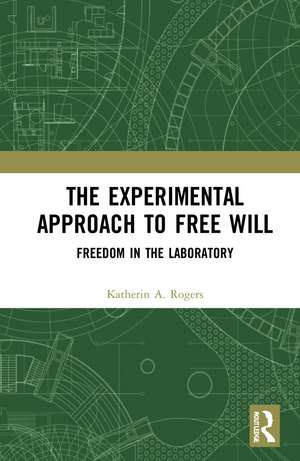The Experimental Approach to Free Will: Freedom in the Laboratory
Autor Katherin A Rogersen Limba Engleză Hardback – 30 mar 2022
- Brings together, and adds to, criticisms of recent experiments (or conclusions drawn from them) which supposedly show that human beings do not have free will
- Analyzes recent experiments supposedly related to human freedom through the lens of a philosophically informed portrait of a robust, libertarian free choice
- Develops a long list of problems – both practical and ethical – facing the experimental study of human freedom
- Proposes a thought experiment set in a distant future of advanced brain science to show that it is likely impossible for science ever to settle the question of free will.
| Toate formatele și edițiile | Preț | Express |
|---|---|---|
| Paperback (1) | 260.34 lei 6-8 săpt. | |
| Taylor & Francis – 8 oct 2024 | 260.34 lei 6-8 săpt. | |
| Hardback (1) | 1002.36 lei 6-8 săpt. | |
| Taylor & Francis – 30 mar 2022 | 1002.36 lei 6-8 săpt. |
Preț: 1002.36 lei
Preț vechi: 1222.39 lei
-18% Nou
Puncte Express: 1504
Preț estimativ în valută:
191.79€ • 200.27$ • 158.38£
191.79€ • 200.27$ • 158.38£
Carte tipărită la comandă
Livrare economică 15-29 aprilie
Preluare comenzi: 021 569.72.76
Specificații
ISBN-13: 9781032194028
ISBN-10: 1032194022
Pagini: 256
Dimensiuni: 152 x 229 x 16 mm
Greutate: 0.51 kg
Ediția:1
Editura: Taylor & Francis
Colecția Routledge
Locul publicării:Oxford, United Kingdom
ISBN-10: 1032194022
Pagini: 256
Dimensiuni: 152 x 229 x 16 mm
Greutate: 0.51 kg
Ediția:1
Editura: Taylor & Francis
Colecția Routledge
Locul publicării:Oxford, United Kingdom
Public țintă
Postgraduate and Undergraduate AdvancedCuprins
Introduction 1. Reasons For and Against Free Will 2. A Paradigmatic Free Choice 3. The Libet Experiments 4. Conscious Will is an Illusion 5. Situationism 6. Ethical Issues in Experiments with Human Subjects 7. The Future Study of Human Freedom: Setting the Stage and Ethical Issues 8. The Future Study of Human Freedom: Practical Problems
Notă biografică
Katherin A. Rogers is Professor in the Philosophy Department at the University of Delaware. Her publications include Perfect Being Theology (2000), Anselm on Freedom (2008), Freedom and Self-Creation: Anselmian Libertarianism (2015), and numerous articles in the philosophy of religion, medieval philosophy, and ethics, including such topics as freedom and foreknowledge, time and eternity, the moral status of abortion, and the justification of punishment.
Descriere
Rogers canvases the literature critical of recent experiments, adding new criticisms of her own. She argues these experiments should not undermine belief in human freedom and lists ethical and practical problems facing the attempt to study free will experimentally.
